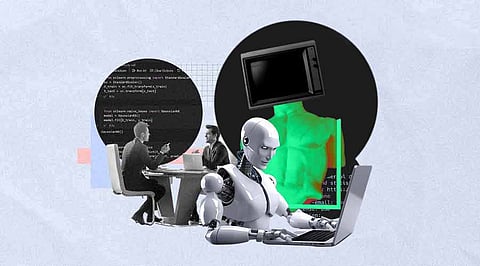

Generative AI (GenAI) has revolutionized how machines respond to human inputs, but the latest evolution is pushing beyond simple responses. Enter Agentic AI—a transformative technology that introduces a new level of autonomy, enabling AI to perform complex tasks without human intervention.
Generative AI (GenAI) has transformed the machine's response to human inputs but, in the latest evolution, pushes beyond simple responses. Then comes Agentic AI-a transformable technology that introduces a level of autonomy, making complex tasks possible for AI in the absence of human beings.
The static, one-time generation-based Large Language Models (LLMs) lack more complex functionality. They don't have any form of self-correcting or reviewing mechanism with the use of next-word prediction to generate content. Agentic AI combines more advanced functions, and LLMs can be used to allow for autonomous management of sophisticated workflows by combining function-call capabilities. It would enable models to shift from being passive generators of content to being agents that could actually complete dynamic processes involving several steps.
Agentic AI can revolutionize several industries by taking over repetitive and complex tasks, allowing professionals to focus on higher-level responsibilities. In human resources, for instance, AI agents could handle tasks such as recruitment, onboarding, performance management, and compliance, significantly reducing manual workloads.
An example of this new capability is Devin AI, created by Cognition AI, which positions itself as the world’s first fully autonomous software engineer. Devin AI has demonstrated the ability to manage software development projects from start to finish—showcasing the potential for AI to execute high-level, end-to-end tasks without human intervention.
The rapid rise of Agentic AI can be attributed to advancements in reinforcement learning (RL), which allows AI systems to learn autonomously by interacting with their environment. RL has already been applied in areas like autonomous vehicles, robotics, and gaming, and it enables AI agents to perform tasks more effectively by learning from trial and error.
When integrated with LLMs like ChatGPT, these autonomous systems benefit from a greater ability to understand and generate human-like text. This combination of RL and natural language processing creates highly capable AI agents that can operate in real-world applications.
The convergence of RL and advanced LLMs has made Agentic AI a key area of focus in artificial intelligence research. Frameworks such as LangChain have simplified the development of AI-driven applications, spurring the rapid adoption of AI agent technologies.
Additionally, new tools such as LangGraph, CrewAI, and GoEX are pushing the boundaries further. These frameworks provide features like memory retention, agent-to-agent communication, and task decomposition, which are critical for scaling AI agents in enterprise environments. Such tools enable AI agents to autonomously collaborate, plan, and complete multi-step tasks.
Agentic AI systems operate through several essential design patterns that enhance their functionality:
Self-Reflection: AI agents can critique their own output, enabling iterative improvements and generating more refined results.
Tool Usage: Agents can call external functions or use tools to update information, making them more flexible than frozen LLMs.
Task Planning: AI agents can break down a project into smaller steps, autonomously managing each stage from start to completion.
Collaboration: Multiple AI agents can collaborate to tackle different aspects of a complex project, working together to execute the overall task with full autonomy.
Agentic AI may be a crucial step toward achieving Artificial General Intelligence (AGI), which is a concept referring to AI systems that can perform any intellectual task that a human can. According to AI luminaries, such as Andrew Ng, founder of DeepLearning.AI, it may very well be that agent-based workflows cause more progress in AI to be made than the actual next generation of foundational models. AGI could happen as "a personal assistant or an automated assistant with real human intelligence" and natural language able to solve just about all kinds of things.
Meta AI’s chief scientist Yann LeCun also sees great potential in AI agents. Meta’s CICERO, launched in 2022, became the first AI agent capable of performing at a human level in the strategy game Diplomacy. The game requires negotiation and strategic planning, highlighting the agent’s ability to mimic human decision-making. However, LeCun remains skeptical about whether LLMs alone can lead to AGI, citing limitations in purely language-based models.
Whatever may be the outcome of AGI from Agentic AI, technology is already having its huge effects. From software engineering to strategic decision-making, it simplifies complex processes and reduces workload with the help of agents like Devin AI and CICERO. It would only get more extensive when every sector comes aboard Agentic AI because when this technology becomes fully equipped for handling complex workflows all alone, the organizations would no more operate as before with their AI working passively instead of becoming a contributing active part of innovation.
